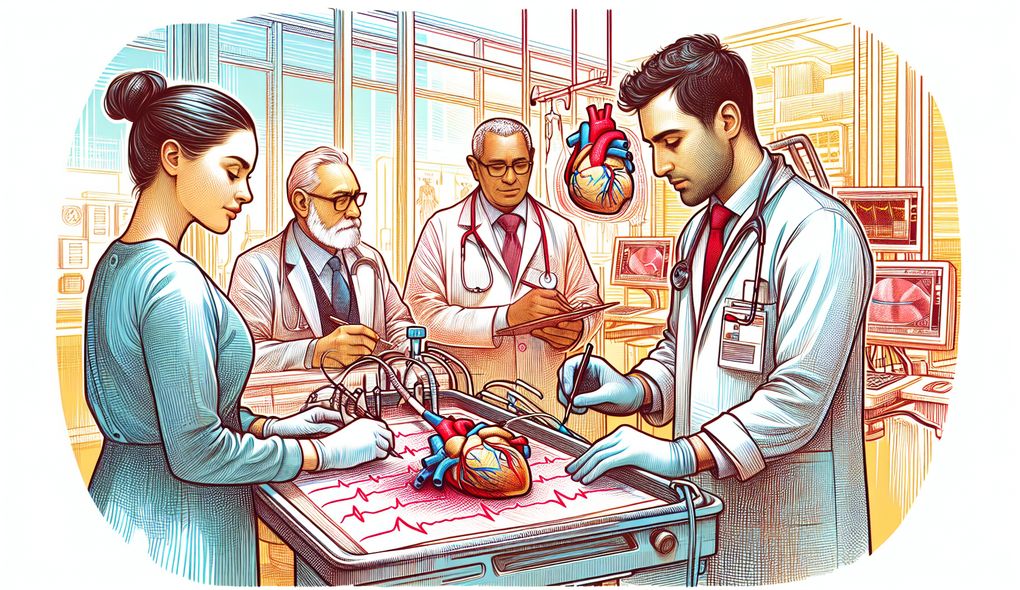Share an experience where you had to adapt your interventional cardiology techniques to suit the specific needs or limitations of a patient.
INTERMEDIATE LEVEL

Sample answer to the question:
During my time as an Interventional Cardiologist, I came across a patient with severe coronary artery disease who had multiple co-existing medical conditions. The patient had limited mobility and was unable to lay flat for the typical duration of the procedure. To adapt to this situation, I modified my technique by performing the procedure in a semi-upright position. This allowed the patient to tolerate the procedure comfortably and minimized any potential complications. I also made sure to communicate closely with the patient's primary care physician and other specialists to ensure a comprehensive and coordinated approach to their care.
Here is a more solid answer:
As an Interventional Cardiologist, I had the opportunity to treat a patient with complex coronary artery disease and significant renal impairment. Given the patient's condition, I had to carefully adjust my interventional cardiology techniques to ensure their safety and optimize outcomes. I collaborated closely with the patient's nephrologist and primary care physician to devise a comprehensive treatment plan. To minimize the risk of contrast-induced nephropathy, I employed a low-contrast volume approach and utilized advanced imaging techniques, such as intravascular ultrasound, to guide the coronary interventions. Additionally, I ensured effective communication with the patient and their family members, explaining the details of the procedure and addressing their concerns. This allowed them to make informed decisions about their treatment and provided them with peace of mind. The patient's successful recovery and improved quality of life demonstrated the effectiveness of adapting my interventional cardiology techniques to suit their specific needs and limitations.
Why is this a more solid answer?
The solid answer provides a detailed account of the candidate's experience in adapting their interventional cardiology techniques to suit the specific needs and limitations of a patient with complex coronary artery disease and renal impairment. It demonstrates their proficiency in interventional cardiology techniques and procedures, as well as their clinical decision-making abilities and strong communication skills. The candidate also highlights their collaboration with other healthcare professionals and their dedication to patient-centered care. However, the answer could benefit from further discussing the candidate's ability to remain composed under pressure, as outlined in the job description.
An example of a exceptional answer:
In my practice as an Interventional Cardiologist, I encountered a challenging case involving a patient with severe coronary artery disease, peripheral vascular disease, and chronic kidney disease on hemodialysis. The patient's limited vascular access due to previous failed attempts presented a unique challenge. To adapt to this situation, I collaborated with an interventional radiologist and vascular surgeon to devise a multi-disciplinary approach. We utilized radial artery access for the coronary angiography and intervention to preserve the patient's limited venous access for hemodialysis catheter placement. This innovative strategy allowed us to successfully complete the procedure without compromising the patient's vascular access for ongoing hemodialysis. Throughout the process, I maintained open lines of communication with the patient, their family, as well as the healthcare team involved in their care. This ensured a collaborative and patient-centered approach, addressing concerns, and providing support. The patient's enhanced quality of life and improved angiographic outcomes validated the effectiveness of my adapted interventional cardiology techniques tailored to their unique needs and limitations.
Why is this an exceptional answer?
The exceptional answer provides an extensive and comprehensive account of the candidate's experience in adapting their interventional cardiology techniques to suit the needs of a complex patient with severe coronary artery disease, peripheral vascular disease, and chronic kidney disease on hemodialysis. It demonstrates their proficiency in interventional cardiology techniques and procedures, clinical decision-making abilities, strong communication skills, and ability to adapt to specific needs and limitations of patients. The candidate also highlights their interdisciplinary collaboration with an interventional radiologist and vascular surgeon, showcasing their teamwork and dedication to patient-centered care. The exceptional answer effectively addresses all the evaluation areas and aligns well with the job description.
How to prepare for this question:
- Familiarize yourself with a wide range of interventional cardiology techniques and procedures, including the latest advancements.
- Stay updated with current research and innovations in the field to be prepared for unique patient cases.
- Develop strong diagnostic and clinical decision-making abilities through continuous learning and active involvement in challenging cases.
- Practice effective communication skills to effectively collaborate with patients, their families, and other healthcare professionals.
- Learn to remain composed under pressure by participating in simulations, mock scenarios, and emergency response training.
What are interviewers evaluating with this question?
- Interventional cardiology techniques and procedures
- Clinical decision-making abilities
- Communication skills
- Ability to adapt to specific needs/limitations of patients

